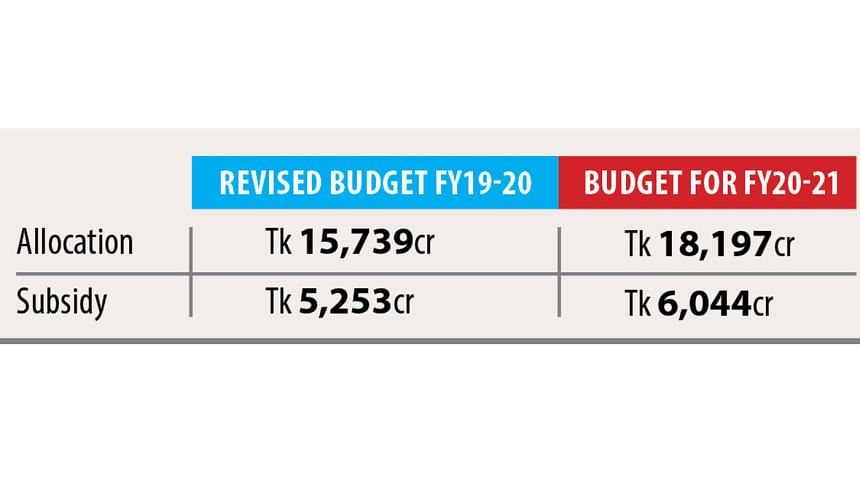Food budget to be 16pc bigger

The next budget is likely to see an increase in allocation for food purchase amid coronavirus crisis as the government plans to earmark Tk 18,197 crore to buy 32.11 lakh tonnes of foodgrains for distribution among the poor and low-income groups.
The allocation could be 16 percent higher than the revised outlay of Tk 15,739 crore in the outgoing fiscal year ending this month, according to finance ministry officials.
The Food-Friendly Programme (FFP) is also likely to see a 19 percent year-on-year rise in allocation. A total of 10.60 lakh tonnes of rice will be distributed through the FFP in the next fiscal year.
Under this programme, rice is sold to 50 lakh poor families for Tk 10 a kg for five months a year. Each family is entitled to buy up to 30kg rice a month.
The government also plans to expand the Open Market Sales (OMS) of rice and flour at subsidised rates in the next fiscal year.
Besides, it may increase purchase of both rice and wheat from domestic and international market. Locally, it plans to buy 24.56 lakh tonnes of rice, 8 percent higher than that in the revised purchase plan in the outgoing fiscal year.
"We are increasing the allocation to protect the poor from food insecurity and tackle any situation like the Covid-19 crisis," said Mosammat Nazmanara Khanum, secretary at the food ministry.
Already, a large number of people have fallen into poverty and are facing food insecurity due to losses of income opportunities after the government enforced countrywide shutdown to curb the spread of Covid-19.
The 65-day lockdown ended on May 30 but its effect on life, livelihood and the economy remains.
To support the poor, the government increased distribution of food items for free, and at nominal prices. Yet, many poor and low-income people complained that they have been deprived of such support.
The government provided 24.50 lakh tonnes of rice and wheat under various schemes such as Gratuitous Relief (GR), special OMS and Food For Work (FFW) between July 1 and May 21, up 12 percent from that in the same period the previous year, according to food ministry data.
Md Shah Kamal, senior secretary at the disaster management and relief ministry, said there would be a rise in the number of poor people because of coronavirus-induced economic shocks around the world.
"Bangladesh is also likely to see a higher number of poor people. We will continue to distribute food to support them," he said.
In the next fiscal year, the government plans to expand food distribution through Food for Work programme. But it plans to cut allocation for GR and Vulnerable Group Feeding (VGF).
Zahid Hussain, former lead economist at the World Bank's Dhaka office, questioned the planned cut.
"It is strange that allocation for the Vulnerable Group Feeding and GR programme is projected to decrease by 17 percent and 61 percent. As far as I know, these are some of the better targeted food-based assistance programs."
He also questioned the sharp rise in operating expense for food procurement and distribution in the next fiscal year.
The expense is projected to increase by 30.9 percent whereas food subsidy is projected to rise by 15 percent, he said.
"Consequently, operating expense as a proportion of the total subsidy is projected to increase from 23 percent in fiscal 2020 to 26 percent in fiscal 2021. For every 100 taka spent on subsidy, it will cost 26 taka to deliver it!"
The government plans to allocate Tk 6,044 crore as subsidy in the next fiscal year compared to Tk 5,253 crore in the revised budget, according to finance ministry officials.
Zahid stressed the need for cash transfer programmes for assisting the poor and the vulnerable quickly and efficiently.
"Most countries have relied on such programmes to mitigate the poverty impact of Covid-19. Bangladesh should do the same," he added.
Akhter Ahmed, country representative of the International Food Policy Research Institute (IFPRI), said the government should focus more on providing food for free instead of selling foodgrains at subsidised rates.
"This is because programmes like OMS and FFP are prone to corruption and a lot of administrative costs are involved. Scope for leakage is low in free distribution and it is not possible for many to buy rice.
"Allocation for free food distribution programmes should be increased as much as possible."
Citing an IFPRI study which found that selection of beneficiaries is more accurate in Food For Work programme, Ahmed said the government, for the time being, should distribute food among such beneficiaries for free.
He also suggested that urban slum dwellers should be provided with food for free during the Covid-19 crisis.


 For all latest news, follow The Daily Star's Google News channel.
For all latest news, follow The Daily Star's Google News channel. 



Comments